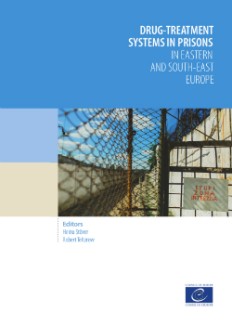Drug-Treatment Systems in Prisons in Eastern and South-East Europe

This research project on drug-treatment systems in prisons in Eastern and South-East Europe looks in detail into the situation of drug users among criminal justice populations and the corresponding health-care responses in nine countries in Eastern and South-East Europe – Albania, Bosnia-Herzegovina, Georgia, Moldova, Montenegro, Russia, Serbia, “the former Yugoslav Republic of Macedonia” and Ukraine – and Kosovo*.
It was conducted between 2013 and 2016, and is a first attempt to collect relevant data on drug use among prison populations and the related responses in the nine countries and Kosovo*.
Although the places chosen are quite heterogeneous in size, structure, legislation, economy, culture and language, they are all in a process of economic, social and cultural transition. This has triggered reforms of some of their prison systems and policies but it has also led to financial and political instability and lack of leadership due to frequent changes in the prison systems’ top management.
The Pompidou Group has been working for several years in Eastern and South-East Europe on prison-related topics and has developed a sizeable network of experts and expertise there. Working together with local government and civil society partners, the Pompidou Group has developed solutions that aim to improve the health of prisoners in accordance with human rights principles.
Many of the places included in this research are in phases of transition: financial and economic burdens are mirrored in prisons. Safety is the priority task of prisons and it consumes a large part of the financial resources that are available for the management of prisons. Health issues are often lower on the (political) agenda of ministries and prison administrations, and thus governors.
Drug use is perceived as one of the main problems faced by prison systems because it threatens security, dominates relationships between prisoners and staff, and leads to violence, bullying and mobbing for prisoners and often for their spouses, families and friends in the community.
Looking at the (often limited) data on the health status of prisoners in these nine countries and Kosovo*, almost all diseases are over-represented in prisons compared to the general population. The same is true for illicit drug use and dependence in prisons, which are disproportionally higher than in the community.
The prevalence of infectious diseases – particularly human immunodeficiency virus (HIV) and Aids, hepatitis B and C, and tuberculosis (TB) – is also often much higher in prisons than outside. Apart from TB, transmission of communicable diseases is mostly driven by the sharing of drug injecting equipment. Estimates of HIV prevalence range from <1% to 20%, which is disproportionally higher than in the community.
High rates of injecting drug use, if coupled with lack of access to evidence-based prevention measures, can result in a rapid spread of HIV and hepatitis B and C. Within the places studied there is much evidence that high-risk behaviour is continuing in prisons: studies indicate that more than half of the drug injecting population report in-prison injection drug use, of whom the majority shared injection equipment with several prisoners.
In many places there is an almost complete unavailability of effective addiction treatment – e.g. opiate substitution or agonist treatment (OAT) – or the potential of such treatment has not yet been fully exploited. Detoxification treatment alone or short-term continuation and interruption of treatment can have negative effects on the health of drug-dependent persons. However, some places have been applying state-of-the-art addiction treatment for quite some time (e.g. “the former Yugoslav Republic of Macedonia”).
In most cases, the prevention and treatment of infectious diseases clearly lack harm-reduction interventions. Among the places considered in this study, Moldova is the only country with existing harm-reduction measures in prisons (e.g. prison-based needle-exchange programmes).
Models of good practice already exist in some of the places covered by this study. Nevertheless, an extra effort is needed to learn from one another by exchanging and encouraging best policies and practices in the countries.
The experts’ general recommendation is to support drug-treatment interventions, and continue prison-based drug policy debates in the places covered by this research project, and introduce reforms that would refocus current drug-control regimes towards a more balanced approach. That would include amending existing drug legislation and making sure that prisons are not filled with people sentenced for drug use per se or for possession of small amounts for personal use.